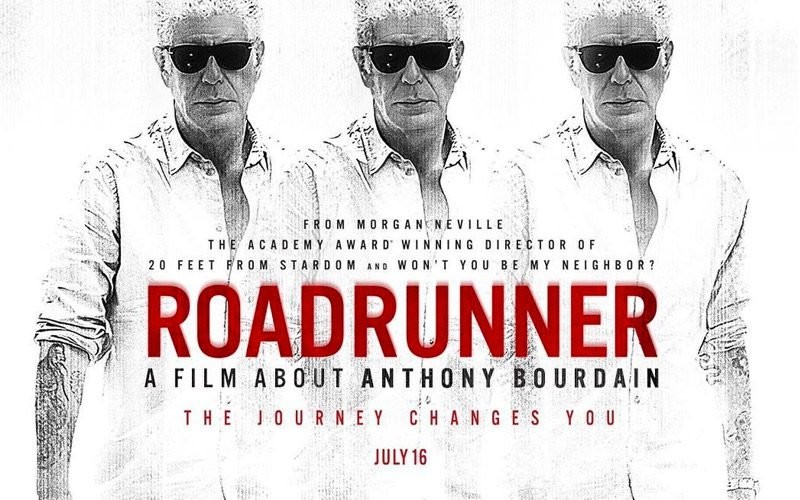Describe This Movie Using One Fandango Quote:
GARDNER BARNES: Anyway, you know me; gotta roll, gotta bird dog, gotta cross females and fences. And if you'd all just ... come with me, you'd see.
Brief Plot Synopsis: Rolling stone can't get no satisfaction.
Rating Using Random Objects Relevant To The Film: 2 cobras out of 5.
Tagline: "The journey changes you."
Better Tagline: "Is it still a 'documentary' if it deepfakes its subject?"
Not So Brief Plot Synopsis: By the 1990s, Anthony Bourdain was already a respected chef in his native New York City. He would go on to widespread fame with his eye-popping industry exposé, Kitchen Confidential, followed by a series of food-related travel shows on the Travel Channel and CNN. Bourdain would eventually take his own life in 2018 at the age of 61.
"Critical" Analysis: When the news broke that beloved chef/author/TV host Anthony Bourdain had committed suicide while filming the latest season of his hit CNN series Parts Unknown, people were stunned. Bourdain, in the eyes of many, had the perfect gig: traveling the world, having adventures and eating delicious food, and enjoying the adulation of millions.
No Pagliacci jokes, please.
The truth about Bourdain both was and wasn't more complicated than he was a guy who had it all, yet still couldn't have what he wanted. In Roadrunner: A Film About Anthony Bourdain, director Morgan Neville (20 Feet from Stardom, Won't You Be My Neighbor?) uses old footage, some previously unaired, and interviews with his friends and crew to try and find some answers.
Unfortunately, answers are hard to come by. Bourdain was a dark dude who often joked about suicide (the first scene in Roadrunner finds him dismissively speculating about what should be done with his remains). This is confirmed by friends like Dave Choe* and Eric Ripert (who discovered Bourdain's body and refuses to speak of it). It becomes clear, however, that few of those closest to him truly thought him capable of such an act.
For proof, look no further than Bourdain's longtime friend John Lurie, whose first line is an incredulous, "He committed suicide, the fuckin' asshole!"
Neville charts Bourdain's rise to notoriety with the publication of 2000's Kitchen Confidential, which led to his halting first foray into television (the Travel Channel's A Cook's Tour) and eventually No Reservations, which would make Bourdain a household name, for better or worse.
Neither hagiography nor hatchet job, Roadrunner is pretty frank about Bourdain's flaws. Coupled with his "hunger for more" was an inability to put his work in perspective, or appreciate its impact while it was happening.
His romantic life mirrored his professional ups and downs. Married for 20 years, then divorced, then remarried (this time having a daughter), then separated, Bourdain is visibly shaken when one of his idols, Iggy Pop, tells him the most thrilling thing in life is to be loved. For a man so devoted to deliberately unrooting himself, that was doubtless tough to hear.
Bourdain's travels did change him, opening his eyes to the hardships and atrocities suffered by so many, which in turn resulted in the journeys themselves becoming the only thing he could bring himself to truly care about. Famous for his avoidance of therapy, one scene in the movie captures him in a session for the Buenos Aires episode of Parts Unknown, and we learn Bourdain had started talking to a therapist a mere two months before he took his own life.
Near the end is when his inner conflicts come to the surface. In between scenes of his doomed romance with filmmaker Asia Argento (who is assigned perhaps too much blame for his fate**) is a sequence where he revisits Provincetown, where he worked in the 1970s, asking, "What the hell was I so angry about?"
Sadly, absent an actual note or diary entry explaining his motives, we'll never know what eventually drove Anthony Bourdain to kill himself. Perhaps the answer is no more complicated than this: if having the greatest job in the world wasn't enough to make him happy, maybe nothing would have.
* A July 15 New Yorker story notes that Neville created an A.I. model of Bourdain's voice for some things he wrote (including an email to Choe), but never actually said. Why Neville went this route instead of, I don't know, just superimposing text over the screen is for him to explain, but deepfaking is a deeply unsettling and dishonest tactic for a so-called "documentary" filmmaker.
** Neville also never sought an interview with Argento, which seems supremely shitty considering how much his movie implies that her "stepping out" was a tipping point for Bourdain's suicide. For these reasons, I'm dropping my rating from 4/5 to 2/5. Stop the presses.
Roadrunner: A Film About Anthony Bourdain is in select theaters now.



